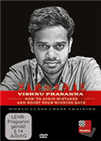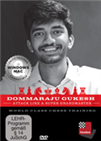A devoted coach with an effective method
To avoid mistakes, you have to understand why they happen. It is certainly tempting to have one of India's most respected coaches on your side while trying to deal with this problem -a topic that Grandmaster Vishnu Prasanna has devoted a lot of time in his life as a coach. His most famous pupil was the young Gukesh Dommaraju, whom he turned into one of the youngest GMs in chess history and who will be fighting for the World Championship crown in Singapore at the end of the year. In the video course How to Avoid Mistakes, produced with ChessBase India's Sagar Shah, Vishnu shows how to be more alert during the game to successfully avoid the dangers of the position and instead lure the opponent into traps.
Firstly, the trainer, who was appointed GM in 2013, names the most common types of error. To make it easier to identify these during the course, the coaching team holds appropriately labelled cards up to the camera at key points during the course: Unforced Error, Calculation and Evaluation, Good Positional Moves = Mistake, Psychology, Tactical, Positional.

Marking out the terrain
Free sample video: Vishnu's own blunder
 Doesn’t every chess game get decided by mistakes? Absolutely. But most players never truly comprehend that they are making the same kind of mistakes over and over again.
Doesn’t every chess game get decided by mistakes? Absolutely. But most players never truly comprehend that they are making the same kind of mistakes over and over again.
Laughing at your own mistakes is good - learning from them is even better!
The course begins with an extremely easy yet astonishing example: Vishnu shows a game of his own that he had actually won. Fully focussed on the winning move, he overlooked what was probably his opponent's last threat and gave away the game by losing the queen to a fork. A painful and very surprising example of a psychological mistake that is particularly common among amateurs: relaxing too early in good positions, which often leads to unforced errors. This is where the second example comes in. It shows that you always have to watch out for simple traps. Paying attention right up to the last moment is elementary. Opponents often make mistakes of their own accord, so it's worth waiting for them.
Vishnu also looks at the games of today's top stars when they were still young. He shows mistakes that Carlsen, Gukesh and Firouzja, for example, would certainly not make today. He uses the example of Carlsen's game against Wojtaszek. Carlsen - now number 1 in the world - manoeuvres the Polish world-class player excellently and exploits his seemingly inevitable mistakes to win. The Norwegian shows convincingly that his opponent would have been better off focussing on prophylaxis instead of an immediate counterattack.
It is fascinating to hear Gukesh's coach explain in one of his then 11-year-old protégé's games that he had been instructed to play long games and wait for his opponent to make mistakes. The challenger of Ding Liren was already good enough at the time to win against strong opponents by using this method.
Free sample video: Gukesh was just 11 years old
Calculate like a master
The games of the eighth world chess champion Mikhail Tal are particularly suitable for training the concentrated exploration of positions. In the chapter "Tal's 2+2=5", the coaching team explains how to follow in the footsteps of the ingenious Latvian chess legend. In the example, a surprising in-between move throws Black's not-so-bad calculation overboard. A tough moment when you realise that you are losing instead of winning - Vishnu emphasises here how important it is to always include the 'trend of the game' in your considerations.

 In this Fritztrainer: “Attack like a Super GM” with Gukesh we touch upon all aspects of his play, with special emphasis on how you can become a better attacking player.
In this Fritztrainer: “Attack like a Super GM” with Gukesh we touch upon all aspects of his play, with special emphasis on how you can become a better attacking player.The 26 examples, which also include Vishnu's students (and now ChessBase authors) such as Surya Ganguly and Leon Mendonca, end with another example from a game by Gukesh. At the Olympiad in Chennai two years ago, he left another globally recognised exclamation mark during his steep rise to world-class status at a young age with his win with black against Fabiano Caruana. Here, Vishnu gives some incredibly interesting insights into Gukesh's development, the sharpening of his opening repertoire and the special preparation before a match against a living legend like Caruana. He also summarises the previous videos in order to highlight some aspects of the game.
These instructive examples are followed - as usual - by interactive exercises to solve yourself. In five detailed test videos, learners can check what they have learnt from what they have seen and how they can apply it here. All these functionalities are included in the e-book format as well as in the stream, download or on the DVD. In addition, all examples are available as complete, annotated games and can be easily downloaded.
Conclusion
In the concluding summary, Sagar Shah and his guest trainer Vishnu Prasanna summarise the findings from the videos once again. At the beginning of the almost 14-minute summary, Sagar Shah emphasises that this course has changed his sense of troubleshooting. This is high praise, as the IM already has excellent playing strength. It is the differentiation of the mistakes that makes this course so novel and extraordinary.
"The most important thing is to be aware of the mistakes. Then you can avoid them", says the coach, before he briefly summarises the above-mentioned error categories once again. The title of the video course sounds tempting, and anyone who works through it with the necessary seriousness and motivation will almost certainly notice an improvement in their practical Play. It is always impressive to learn about the training methods of the coaches who have trained world-class players during their early development.
Even if you will never reach this level yourself, these new ideas enrich your own game and help to minimise annoying mistakes.
Doesn’t every chess game get decided by mistakes? Absolutely. But most players never truly comprehend that they are making the same kind of mistakes over and over again.
























